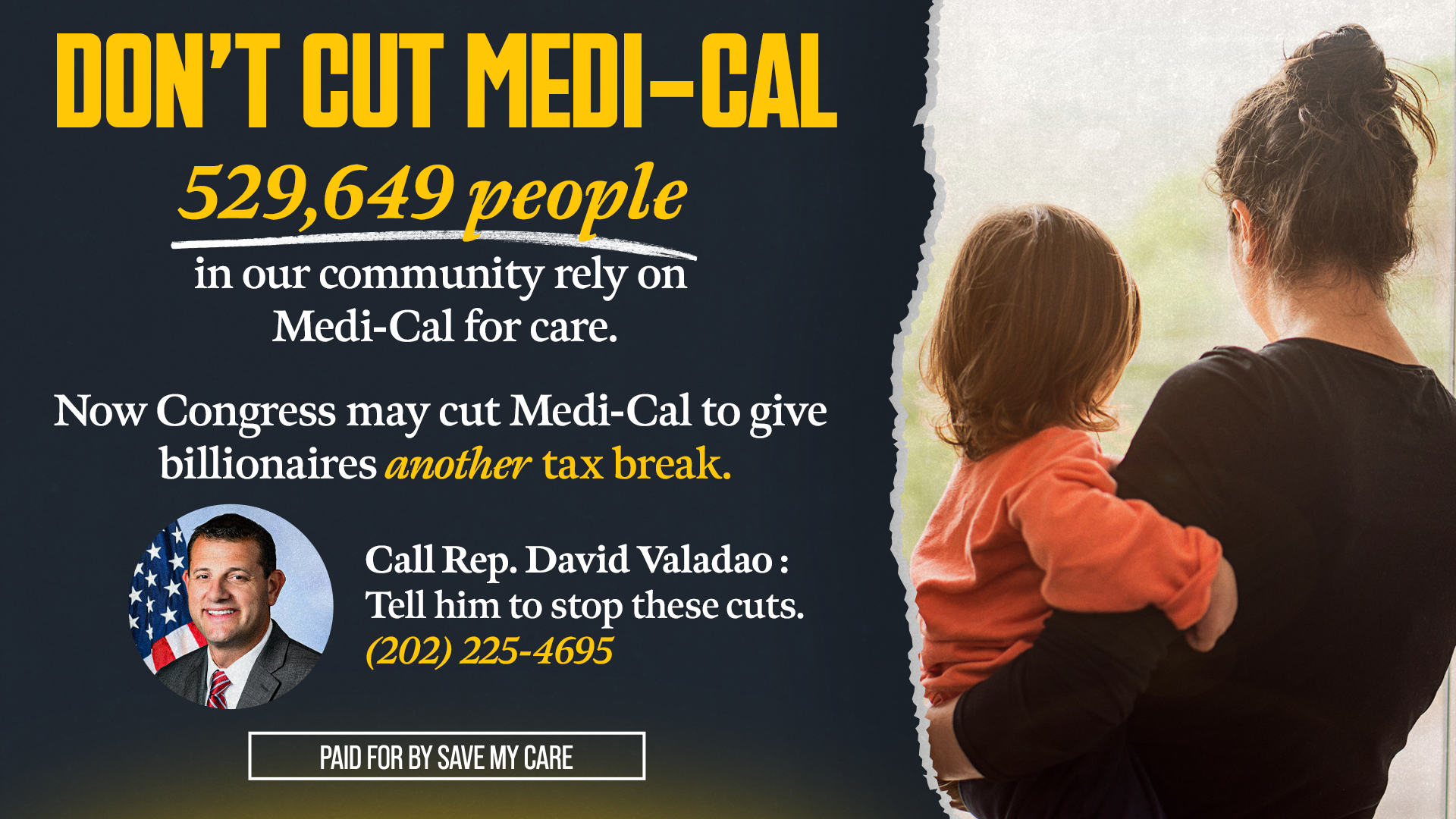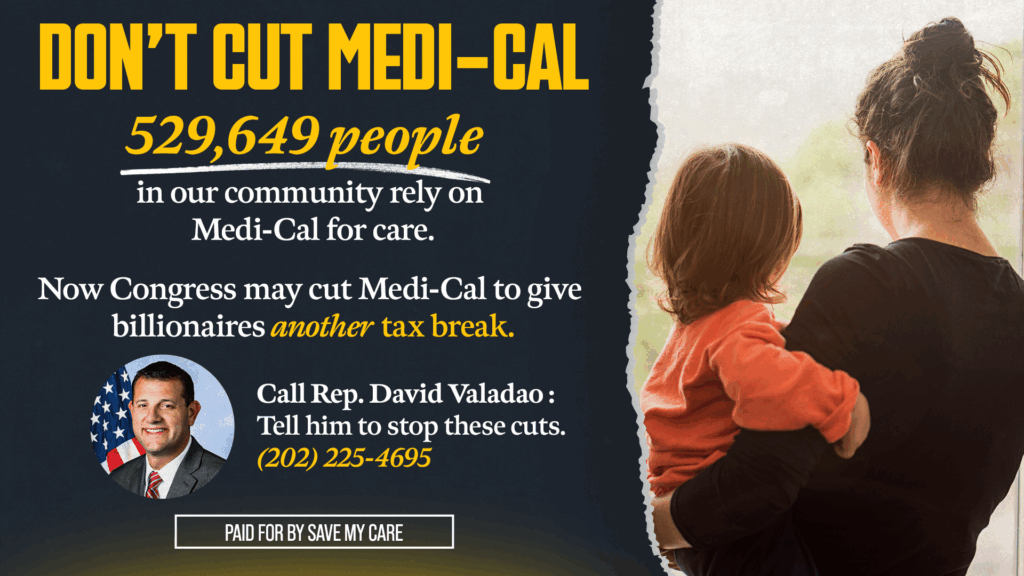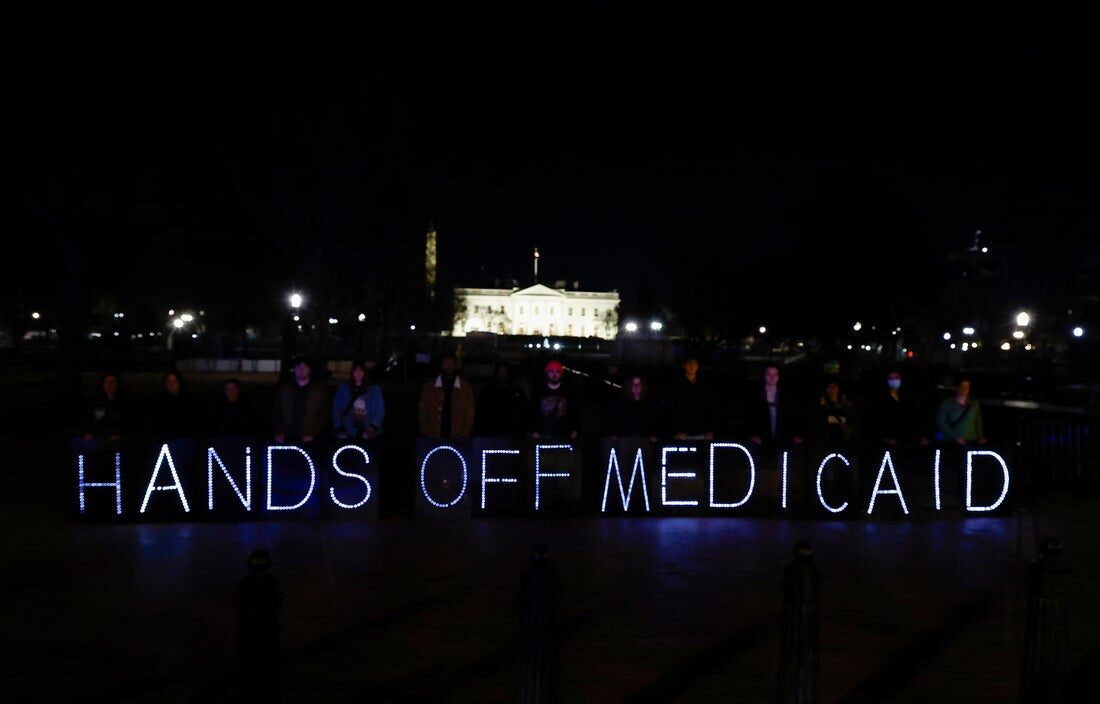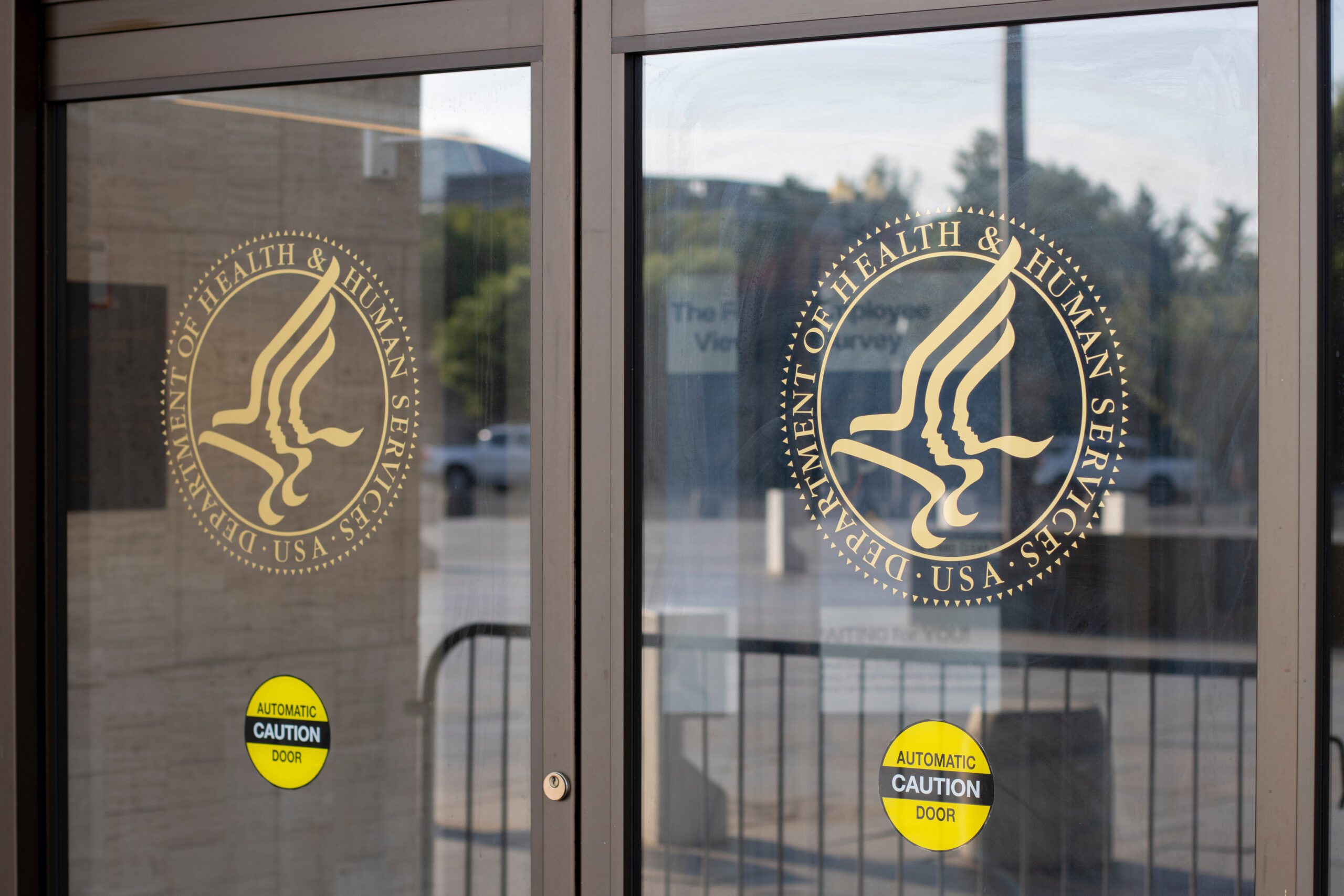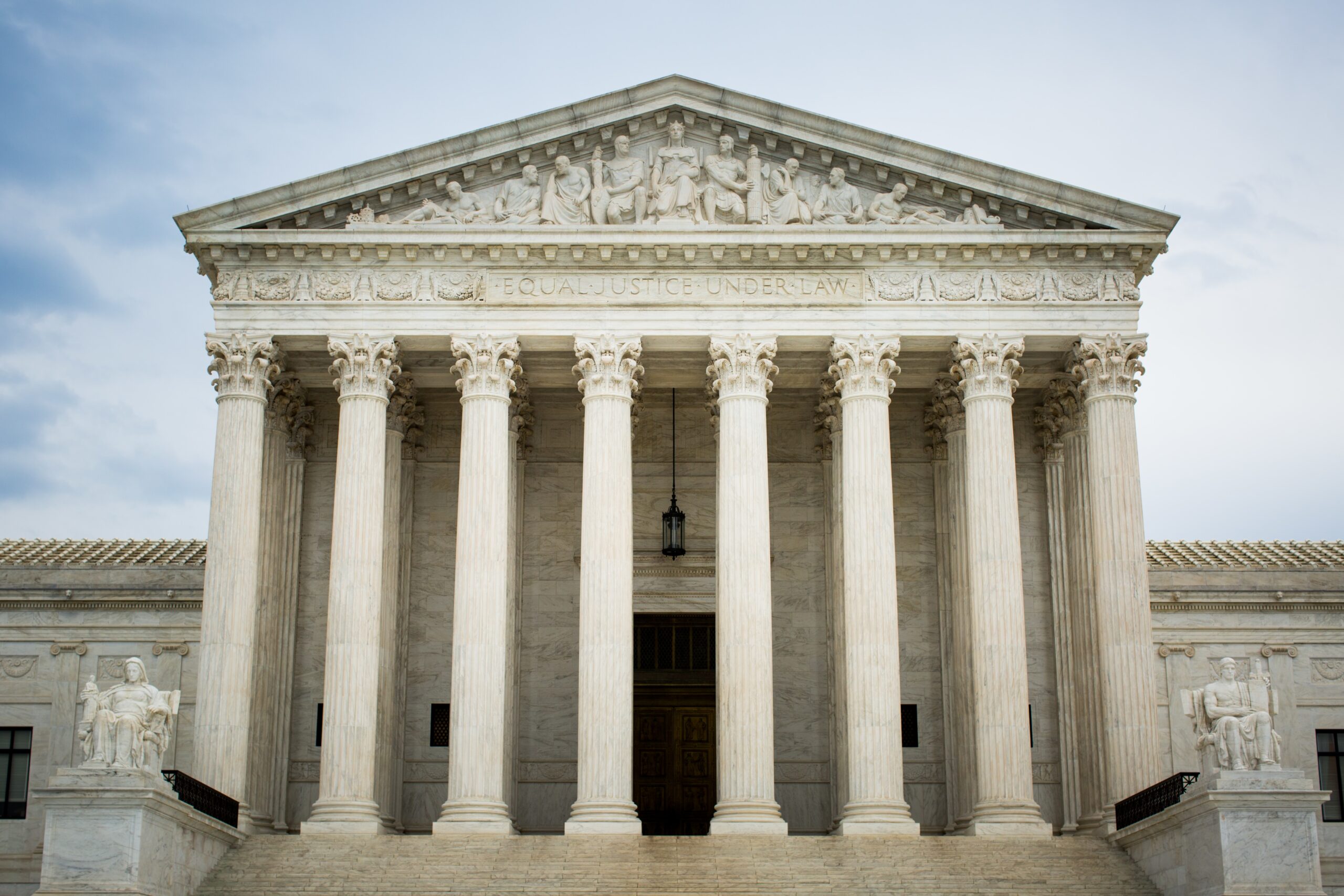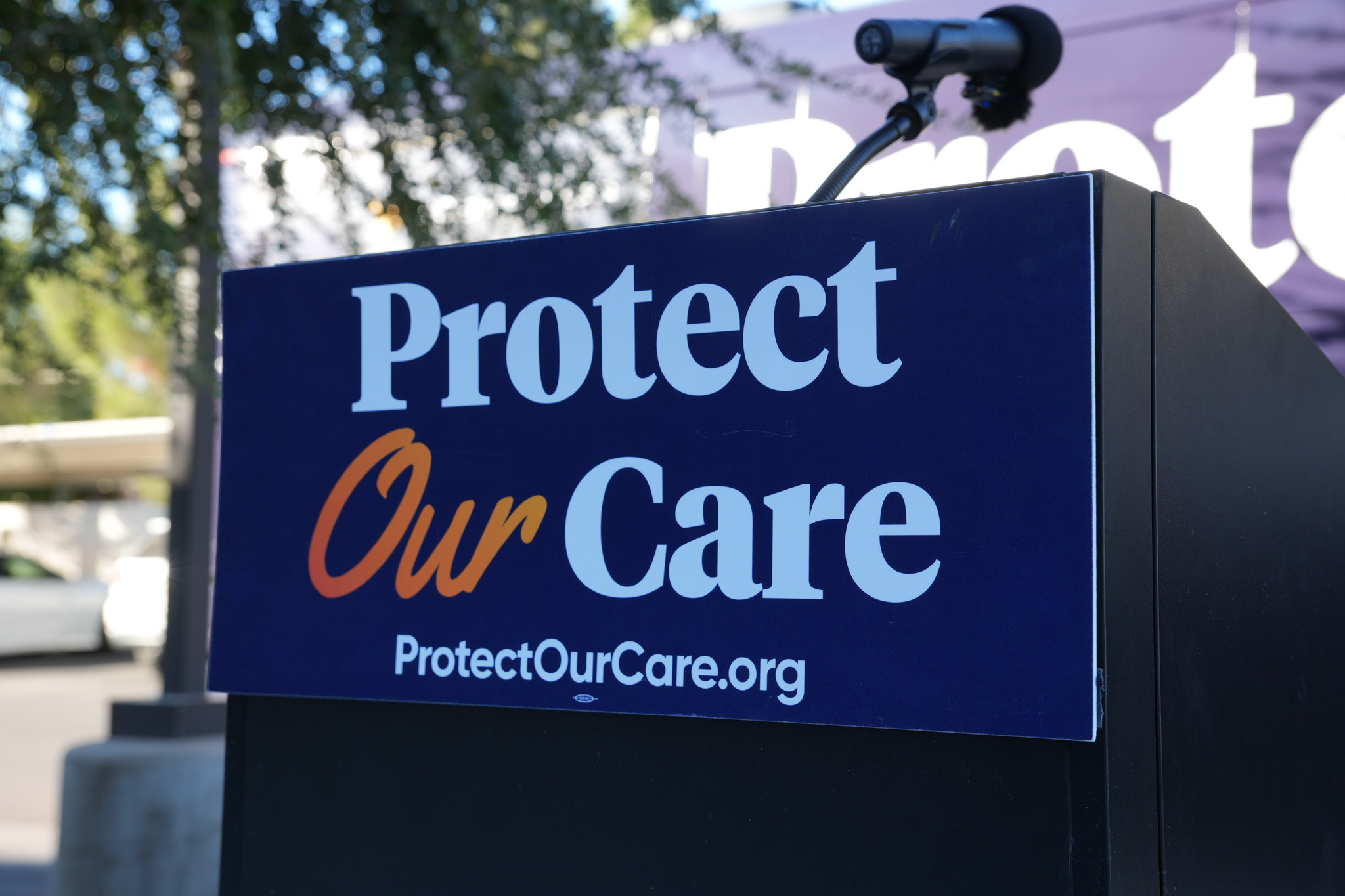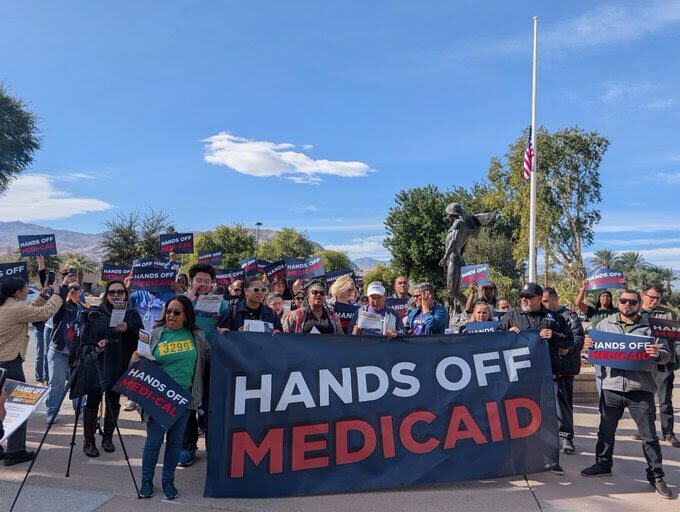The events were headlined by Senators Tammy Baldwin, Ruben Gallego, and Peter Welch; Representatives Gwen Moore, Mark Pocan, Bobby Scott, George Latimer, Robert Garcia, Lateefah Simon, Paul Tonko, and Betty McCollum; former Congresswoman Gabby Giffords; and more.
During the Congressional recess, members of Congress, local elected officials, and advocates joined Protect Our Care for 29 events in 13 states, calling on Republicans to reject any cuts to Medicaid in their upcoming budget.
Right now, House Energy and Commerce Committee members are tasked with finding $880 billion in cuts, and according to the nonpartisan Congressional Budget Office, to achieve the GOP’s budget goals, they must cut billions from Medicaid, putting health care for more than 70 million Americans in jeopardy.
Protect Our Care is continuing its “Hands Off Medicaid” campaign to underscore the importance of Medicaid across the country. Alongside partners, lawmakers, and other advocates, Protect Our Care is working to defend Medicaid from the Republican-led plan to slash funding to pay for another round of tax cuts for the wealthy and big corporations. Read more about our latest ad campaigns here.
ALASKA
Monday, April 21 – SEIU “Medicaid Monday” Event with SEIU Caregivers, Clients and Community Members outside Nick Begich’s Anchorage Office: SEIU Caregivers, clients, and community members allied outside Representative Nick Begich’s Anchorage office today to deliver a powerful message: their work is essential, and it’s time lawmakers treated it that way. The rally was organized in response to proposed Medicaid cuts that would harm Alaskans who rely on home- and community-based care. Participants shared their stories and called on lawmakers to protect the services that allow seniors and people with disabilities to live with dignity and independence. “We’re here to fight for our families, our jobs, and our clients,” said Sasha Johnson, a caregiver and frontline advocate. “We are NOT waste—our work isn’t wasteful, our clients aren’t waste, and our experience isn’t a waste. Matter of fact, we SAVE the government so much money, and that’s what we came to say.” You can read the post-event release here. 
- Alaska Public Media: ‘We’re not waste,’ Medicaid-supported workers tell Alaska congressman
- Your Alaska Link: Anchorage rally urges lawmakers to protect Medicaid funding in Alaska
Friday, April 11 – Medicaid Awareness Month/SEIU Caregiver Event with SEIU 775 Members Shirley Johnson and Shanah Kinison: Caregivers and SEIU 775 members Shirley Johnson and Shanah Kinison joined Protect Our Care Alaska to discuss their recent trip to DC to speak with Senator Dan Sullivan about the importance of Medicaid to Alaska seniors and people with disabilities, and to deliver the clear message: “don’t cut Medicaid.” Both Johnson and Kinison pushed back on the senator’s repeated references to “fraud, waste, and abuse” in Medicaid, urging him to focus instead on the lives that would be upended by cuts to care. “I asked him directly, ‘Am I fraud? Am I waste?’” said Shanah Kinison, a Haines Caregiver, who cares for a medically fragile teen living in the Tlingit village of Klukwan. “Medicaid pays for my job. Medicaid pays for my health care. I don’t feel like a waste.” You can watch the full event here, and read the post-event release here.
Anchorage Daily News: Opinion: Trump’s Threat to the Alaska Economy.
- “Cuts of that magnitude would almost certainly shut down rural hospitals across Alaska, eliminate health coverage for tens of thousands of Alaskans, sharply increase maternal and infant mortality, and cut off funding for mental health and substance abuse treatment.”
ARIZONA
Monday, April 21 – Medicaid Panel Event in Tucson with Former Congresswoman Gabby Giffords, State Senator Priya Sundareshan, Reproductive Freedom for All and Advocates: Former Congresswoman Gabby Giffords, State Senator Priya Sundareshan, Reproductive Freedom for All, and emergency physician Dr. Larry DeLuca gathered for a panel highlighting Medicaid’s crucial role in Arizona’s health care system and what’s at stake for Arizonans if funds are cut. “When we talk about Medicaid, we need to stop saying they, and we need to start saying we,” said Dr. Larry DeLuca. “You don’t plan to be in a car accident. No one puts themselves in front of a loaded gun. People can unexpectedly have their lives radically changed, and not just in the short term […] People are not going to get less sick because we took away their healthcare; just the opposite.” You can read the post-event release here. 
- KGUN 9: Giffords joins reproductive health group in Tucson forum opposing Medicaid cuts
Tuesday, April 22 – Medicaid Town Hall with Senator Ruben Gallego and Reproductive Freedom for All: US Senator Ruben Gallego and Reproductive Freedom for All hosted a town hall in Phoenix alongside Protect Our Care Arizona in Phoenix to highlight the devastating consequences of Republican-led efforts to cut Medicaid, known as AHCCCS in Arizona, and the impacts it will have on essential reproductive healthcare for millions of Arizonans. “Women in Arizona deserve to have control over their own bodies,” said Senator Gallego. “But Republicans in Congress want to strip access to reproductive care from poor women in order to give tax cuts to the rich. I’m doing these town halls across the state to hear from people who will be impacted from these cuts and to make clear that Arizonans won’t stand for it.” You can read the post-event release here. 
- KJZZ: Sen. Ruben Gallego says proposed Medicaid cuts will leave families uninsured
- Cronkite News (AZ PBS): Medicaid Cuts- Medicaid Awareness Month (segment begins at 18:40)
CALIFORNIA
Friday, April 25 – Medicaid Awareness Month Event with Congresswoman Lateefah Simon and Health Care Advocates: Lateefah Simon and Medi-Cal advocates joined Protect Our Care CA to highlight how Medicaid is under attack like never before. During the event, speakers discussed what’s at stake for this vital program and for the 15 million Californians who rely on Medicaid for health care, including millions of Californians with disabilities. View the pre-event advisory here.
Thursday, April 24– SEIU Disability Week of Action Medicaid Rally in David Valadao’s District: California health care advocates came together in Bakersfield to call on Rep. Young Kim (CA-22) to protect Medicaid for Californians with disabilities. Advocates discussed the need to protect Medicaid funding and called on the congressman to reject cuts to the program’s budget that could rip care away from disabled Californians. You can watch footage from the rally here.
- ABC23: Rally against potential cuts to Medicaid draws community support in Bakersfield
- ABC23: Community rallies in Bakersfield to oppose Medicaid cuts
- KBAK: Dolores Huerta, protesters from around California rally against potential healthcare cuts
Tuesday, April 22– SEIU Disability Week of Action Medicaid Rally in Young Kim’s District: California health care advocates came together in Anaheim to call on Rep. Young Kim (CA-40) to protect Medicaid for Californians with disabilities. Advocates discussed the need to protect Medicaid funding and called on the congresswoman to reject cuts to the program’s budget that could rip care away from disabled Californians. You can watch footage from the event here.
- ABC 7: Protesters rally outside SoCal congresswoman’s office over potential Medicaid cuts
- NBC Los Angeles: Rally against proposed cuts to Medicaid
- Fox 11: Rally to protect Medicaid in Anaheim
- KTLA 5: Rally to protect Medicaid in Anaheim
- Telemundo 52: Rally to protect Medicaid in Anaheim
- LA Live: Rally to protect Medicaid in Anaheim
- Fullerton Observer: Protest Rally at Congressmember Young Kim’s Office to Oppose Medicaid Cuts
- KABC-LA
Monday, April 21 – SEIU Disability Week of Action Medicaid Rally in Ken Calvert’s District: California health care advocates came together in Palm Desert to call on Rep. Ken Calvert (CA-41) to protect Medicaid for Californians with disabilities. Advocates discussed the need to protect Medicaid funding and called on the congressman to reject cuts to the program’s budget that could rip care away from disabled Californians. You can watch an Instagram reel of the rally here.
- KESQ: Rally outside Calvert’s office urging he block potential Medicaid cuts
- Roll Call: The Bernie Sanders tour puts California GOP on notice
- NBC Palm Springs: Advocates Rally in Palm Desert Urging Rep. Ken Calvert to Reverse Vote on Medicaid Cuts
Thursday, April 17 – Children’s Health Care Rally at Rep. Young Kim’s Office: Kids, parents, advocates, and the broader community rallied in support of Medicaid in front of Rep. Young Kim’s office (CA-40) in Anaheim to call on the congresswoman to protect Medi-Cal for children who rely on the program for health care.
Wednesday, April 16—Children’s Health Care Rally at Rep. David Valadao’s Office: Kids, parents, advocates, and the broader community rallied in support of Medicaid in front of Rep. David Valadao (CA-22) in Bakersfield to call on the congressman to protect Medi-Cal for children who rely on the program for health care.
Friday, April 11 – Medicaid Awareness Month Event with Congressman Robert Garcia and California Medicaid Advocates: US Rep. Robert Garcia, family physician Dr. Ian Kim, and health care advocates Karen Reside and Josephine Rios joined Protect Our Care CA to highlight how Medicaid is under attack like never before. Donald Trump and Republicans in Congress like David Valadao, Young Kim, and Ken Calvert are working to cut Medicaid by nearly a trillion dollars to pay for tax-breaks to the ultra-wealthy. “House Republicans, including some here in California, are directly lying to the American public about this budget proposal. There’s no question: there are Medicaid cuts in this budget framework.” said Congressman Robert Garcia. “For us in California, the millions and millions of people who rely on Medi-Cal, they are going to either lose coverage, have reduced coverage, or be forced to leave coverage.” You can watch the event here.
- KPFA: Healthcare advocates and CA congressmember Robert Garcia blast republican move to slash Medicaid by $880 billion
IOWA
Thursday, April 24 – Medicaid Community Forum with Health Care Advocates: Protect Our Care Iowa co-hosted a community forum with SEIU, AFGE, Planned Parenthood, and ICAN to highlight what’s at risk for Iowans if the proposed Medicaid cuts in the federal budget become a reality. Doctors, health care workers, and Iowa residents with lived experience shared stories and insight into how these cuts would affect access to care, local hospitals, and families across our state. “We are here today to let Representative Mariannette Miller-Meeks know that we want answers and we don’t want Medicaid to get cut,” said Gabriela Fuentes of Planned Parenthood Advocates of Iowa. “As you can see, people are really looking for answers. What is going to happen with Medicaid? There are so many people that are going to be affected if Medicaid is cut.” 
- KGAN: Iowans voice concerns over Medicaid cuts at North Liberty forum, urge action from lawmaker
- KCRG: Putting a Balanced Budget to the Test
Tuesday, April 22 – Office Visit, Petition Delivery, and Storyteller Sharing at Representative Marianette Miller-Meeks’ Indianola District Office: Storytellers and advocates visited Representative Miller-Meeks’ office to discuss the importance of Medicaid and what’s at risk for vulnerable Iowans. Eleven storytellers and three staff members listed above met at Rep. Miller-Meeks’ Indianola office to speak with office staff about the proposed cuts to Medicaid and the impacts it would have on Iowans. “Any vote Congresswoman Miller-Meeks makes to gut Medicaid funding is a direct hit to the health and well-being of thousands of Iowans in her district,” said Jill Kordick of Norwalk. “Medicaid is a vital lifeline for children, seniors, pregnant women, and people with disabilities. These cuts would jeopardize access to care, force impossible choices for families, and deliver a fiscal sucker punch to rural health systems.
MAINE
Thursday, April 24 – Medicaid Day of Action Event with Maine House Chair of Appropriations Drew Gattine and Dr. Jessica Faraci: Maine House Chair of Appropriations Drew Gattine and Dr. Jessica Faraci of Maine Medical Association joined Protect Our Care Maine to highlight how Medicaid, referred to as MaineCare in Maine, is under attack like never before. Donald Trump and Republicans in Congress are working to cut Medicaid by nearly a trillion dollars to pay for tax breaks to the ultra-wealthy. Medicaid plays a vital role in providing affordable health care coverage for 400,000 Mainers, including seniors, people with disabilities, with nearly half being Maine children and people suffering from opioid addiction and mental health disorders. Gattine and Faraci discussed how the most vulnerable Mainers, particularly in rural counties, rely on MaineCare as a social safety net. “Medicaid is a vital necessity for Mainers,” said State Rep. Drew Gattine. “In rural counties like Aroostook, Somerset, and Washington, 40% of the population benefits from MaineCare. Cutting Medicaid will also jeopardize an important element of Maine’s economy. Thousands upon thousands of Mainers’ jobs in the health care industry is at stake. Hospitals, mostly rural, will be jeopardized.” You can read the post-event release here. 
- Spectrum News: Potential federal cuts could jeopardize MaineCare coverage, officials say
- WABI Augusta: Protect Our Care Maine speak out against potential federal Medicaid cuts (also ran during 5pm, 7am broadcast)
- WPFO Fox Portland: Protect Our Care Maine to Discuss What Potential Medicaid Cuts Would Mean for Mainers (also ran during 7am broadcast)
- WGME: Protect Our Care Maine to Discuss What Potential Medicaid Cuts Would Mean for Mainers (also ran during 8am, 6am, 5am, and 4am broadcasts)
- WGME CBS Portland: Protect Our Care Maine, Democratic Lawmaker Discuss Threat of Medicaid Cuts
- WPFO Fox Portland: Protect Our Care Maine, Democratic Lawmaker Discuss Threat of Medicaid Cuts
- Maine Public: Washington Republicans propose billions of dollars in Medicaid cuts that would threaten MaineCare
MINNESOTA
Wednesday, April 16 – Medicaid Defense Event with Congresswoman Betty McCollum and Health Care Advocates: Congresswoman Betty McCollum and SEIU Advocates joined Protect Our Care Minnesota to highlight how Medicaid is under attack like never before. Donald Trump and Republicans in Congress are working to cut Medicaid by nearly a trillion dollars to pay for tax-breaks to the ultra-wealthy. “One out of four Minnesotans rely on Medicaid for their health care. That includes 620,000 children and 90,000 seniors. Working parents and children are 65% of enrollees,” said Congresswoman Betty McCollum. “We’re better than this. We need to budget. We need to plan with honesty and integrity, including families that are going to be directly impacted by these cuts. These are our brothers, our sisters, our cousins, our neighbors. They’re us.” You can watch the event here.
- Red Lake Nation News: Congresswoman Betty McCollum and SEIU Advocates Join Protect Our Care Minnesota to Call Out GOP Plans to Cut Medicaid, Take Away Vital Health Care from Minnesotans
- KSTP: McCollum Highlights Threats to Medicaid
Duluth News Tribune: Opinion: Medicaid on the Chopping Block for Northland Seniors.
- “This means that cuts to Medicaid would not only hurt seniors who live in nursing homes or rely on long-term care services, but their families, too, who would have to shoulder the additional costs of caregiving. Everyone taking care of an aging relative knows the costs are exorbitant, and we should be making it easier for people to age with dignity, not harder. It’s no exaggeration to say Medicaid cuts would touch nearly every household across the nation.”
NEW HAMPSHIRE
Monday, April 14 – Medicaid Awareness Month/Rural Health Discussion with New Hampshire Advocates: Health care advocates Tuess Kuenning of Bi-State Primary Care Association, Ed Shanshala of the Ammonoosuc Community Health Services and Samuel Burgess from New Futures joined Protect Our Care New Hampshire to discuss how cuts to Medicaid would cause rural communities to lose access to critical health services. The panel focused on the urgent need to preserve and strengthen Medicaid in the face of potential federal funding cuts and ongoing economic uncertainty. “Medicaid is an economic lifeline for rural communities…” said Ed Shanshala, CEO of Ammonoosuc Community Health Services. “These dollars move around within the local economy. People pay their mortgage. They buy groceries. They buy a car. Without that investment in the state loan repayment program, it’s difficult. They want to come back. They want to care for their friends, family, and neighbors who nurtured them.” You can watch the full event here.
- WMUR: New Hampshire Health Leaders Warn Federal Medicaid Cuts Will Hurt Rural Health Centers
- Caledonian Record: Proposed Medicaid Cuts Raise Alarms In North Country
- NHPR: ‘Hit From All Sides Right Now’: Proposed Budget Cuts Could Strain Nh’s Safety Net Health System
NEW YORK
Tuesday, April 22—Medicaid Awareness Month Event with Congressman George Latimer and Health Care Advocates: Congressman and former Westchester County Executive George Latimer, White Plains Mayor Thomas Roach, White Plains Common Council President Victoria Presser and Westchester County Legislator Ben Boykin joined Protect Our Care New York to highlight how Medicaid is under attack like never before. Donald Trump and Republicans in Congress are working to cut Medicaid by nearly a trillion dollars to pay for tax-breaks to the ultra-wealthy. “Medicaid isn’t just a budget line, it’s a lifeline for millions of New Yorkers,” said Congressman George Latimer. “In the 16th District alone, tens of thousands of seniors depend on Medicaid to stay healthy and secure. We cannot, and will not, allow Republicans to balance the budget on the backs of those who can least afford it.” You can watch the Congressman’s remarks here.
- MidHudson News: Latimer rallies Westchester residents to oppose Medicaid cuts
Monday, April 21—Medicaid Defense Event with Senator Peter Welch and Congressman Paul Tonko: Senator Peter Welch (D-VT) and Congressman Paul Tonko (NY-20) hosted a rally in Plattsburgh to highlight the importance of protecting Medicaid coverage. Welch and Tonko discussed how Congressional Democrats are fighting to defend Americans’ access to health care and are working to push back against efforts to kick Vermonters and New Yorkers off Medicaid to pay for a tax cut for those who don’t pay their fair share. “This is about health care and the well-being of every American. President Trump and Republicans’ budget would cut care for those who need it most, all so they secure tax cuts for billionaires—that’s an acceptable deal to them. But as far as I’m concerned, there is no acceptable cut to health coverage,” said Senator Welch. “So while Republicans are attempting to finance a tax cut for the ultra-wealthy, Democrats will continue working to protect access to Medicaid for communities small and large and work to lower costs for hardworking families and seniors.”
- NBC5 Plattsburgh: Sen. Peter Welch holds rally in Plattsburgh, sounds alarm over proposed federal cuts
- NBC5 Plattsburgh: Vermont Sen. Peter Welch, NY Rep. Paul Tonko to hold joint rally in Plattsburgh
- WCAX: Welch hosts North Country rally to protect Medicaid rights
- WAMC: Vermont Senator Peter Welch and New York Congressman Paul Tonko hold rally to support Medicaid in Plattsburgh
- VermontBiz: Welch, Tonko, community members rally in support of Medicaid
- The Press-Republican: Welch, Tonko rally draws attention to possible Medicaid cuts
Playbook NY: “Medicaid Money: The Democratic-aligned Protect Our Care today will release a batch of ads knocking battleground New York House Republicans over Medicaid. The House GOP managed to pass a budget framework on Thursday that could lead to benefit program cuts. The ads are a sign Democrats will try to press the budget issue to their advantage next year — and squeeze moderate blue state lawmakers.” Written by Nick Reisman.
LoHud: Opinion: Republicans in Congress — like NY’s Mike Lawler — think Medicaid doesn’t matter.
- “No one went to the polls in November to cut health care for our nation’s most vulnerable, and if Republicans get their way, we will all pay the price. It has never been more critical to do everything we can to protect affordable health care access in America.” Protect Our Care New York placed the piece in LoHud written by Carolyn Martinez-Class, co-executive director of Citizen Action of New York and Jasmine Gripper, co-director of the New York Working Families Party.
NORTH CAROLINA
Saturday, April 19 – Poor Peoples’ Campaign Rally in Raleigh, North Carolina: Protect Our Care North Carolina provided support for the Poor Peoples’ Campaign rally in Raleigh, North Carolina. During the rally, speakers outlined several demands of the Trump administration, including maintaining due process, protecting voting rights, and adherence to a “Moral Budget”.
- WRAL: Raleigh, Durham join nationwide day of action to protest actions of Trump administration
Thursday, April 24 – Medicaid Awareness Month Event with State Representative Sarah Crawford and Health Care Advocates: State Rep. Sarah Crawford; Shannon Dingle, Little Lobbyists; and Eric Schneidewind, former AARP National President joined Protect Our Care North Carolina to highlight how Medicaid is under attack like never before. “I get to see first hand, every day, the power of Medicaid. It is not simply a safety net. It is the foundation that holds up lives, families, providers, and their entire community system of care,” said State Representative Sarah Crawford. “But that foundation is under attack by political games. National Republicans, especially Donald Trump, are actively pushing to gut this vital program. Why? To pay for tax cuts for the wealthy. “ You can watch the event here, and view the post-event release here.
 PENNSYLVANIA
PENNSYLVANIA
Friday, April 25 – Medicaid Awareness Month Event with State Senator Vincent Hughes and Health Care Advocates: State Senator Hughes joined the Committee to Protect Health Care, Commonwealth Communications, and Protect Our Care Pennsylvania to highlight how Medicaid is under attack like never before. View the pre-event advisory here.
Monday, April 14 – SEIU Medicaid Rally in Representative Ryan Mackenzie’s District: Local community groups and constituents across the district rallied at Rep. Mackenzie’s district office, demanding accountability for his support of devastating Medicaid cuts and corporate giveaways championed by President Trump and House Republicans.
Wednesday, April 16 – SEIU Medicaid Rally in Representative Lloyd Smucker’s District: Local community groups and constituents across Lancaster County will rally at Rep. Lloyd Smucker’s district office Wednesday, April 16th, demanding accountability for his support of devastating Medicaid cuts and corporate giveaways championed by President Trump and House Republicans.

Thursday, April 17 – SEIU Medicaid Rally in Representative Scott Perry’s District: Protect Our Care Pennsylvania provided support for an SEIU rally to hold Representative Scott Perry accountable for Republican attacks on Medicaid. Local community groups and constituents rallied at Rep. Scott Perry’s district office, demanding accountability for his support of devastating Medicaid cuts and corporate giveaways championed by President Trump and House Republicans.

VIRGINIA
Wednesday, April 23 – Medicaid Awareness Month Event with State Senator Ghazala Hashmi and Health Care Advocates: Chair of the Senate Education and Health Committee Ghazala Hashmi joined SAARA of Virginia and Protect Our Care in discussing the impact that proposed cuts to Medicaid – including the potential automatic disenrollment of more than 629,000 Virginians in the expansion population – would have on behavioral health, including treatment for substance use disorders. “We are facing the biggest threat now to health care since the last Republican attempt to repeal the Affordable Care Act,” said Senator Hashmi. “Congressional Republicans are now targeting $880 billion in cuts to Medicaid only for the purpose of funding irresponsible tax giveaways for corporations and for those who are already ultra-wealthy. Gutting Medicaid is going to be devastating to Virginians in every single zip code, and it will set us back in the fight to end the opioid epidemic.” You can watch the event here.

- Courthouse News: Looming Medicaid Cuts Threaten Progress Made in Combating Opioid Crisis
- Richmond Times-Dispatch: For Some Virginians, Talk of Cutting Medicaid Funds Hits Home (Full text is viewable here)
- WRIC: Dems Warn That 630K Virginians Could Lose Health Insurance if Medicaid Is Cut
Thursday, April 18 – Medicaid Roundtable with Congressman Bobby Scott and Health Care Advocates: Protect Our Care Virginia provided storyteller Tony Hedgepeth, a veteran and member of SEIU Virginia 512, for a roundtable hosted by Congressman Bobby Scott and The Commonwealth Institute. Congressman Scott and advocates highlighted Congressional Republicans’ proposed cuts to Medicaid. Congressman Scott also unveiled a new report from The Commonwealth Institute on the impact of the proposed cuts to Medicaid on veterans and military families. “This letter on Medicaid suggests that they’re not going to vote for Medicaid cuts, but unfortunately that’s not the case,” said Congressman Scott. “If you read the letter they say they won’t cut Medicaid for vulnerable populations, this population, or that population, but it doesn’t rule out cuts in Medicaid … The fact of the matter is the budget cutting Medicaid is necessary to help fund tax cuts for billionaires.” You can watch the event here.
- 13NewsNow: Impacts of possible Medicaid cuts on veterans and their families
- WAVY10: Is Medicaid on or off the DOGE chopping block?
Richmond Times Dispatch: Commentary: Slash funding for Medicaid and lose the fight against addiction
- “If President Donald Trump and Congress follow through on their plans to gut Medicaid to pay for tax giveaways for corporations and billionaires, Virginia will be forced to dramatically cut back on addiction treatment services. Without federal support for Medicaid, the state would likely cut back on peer recovery specialists, stop covering crucial medication, and decrease the number of treatment beds, increasing wait times for people to get the help they need. That will have real, devastating impacts on people’s lives.” The op-ed was posted here, and the full text is viewable here.
WEST VIRGINIA
Thursday, April 24 – Medicaid Awareness Month Event with Delegate John Williams and Advocates in Morgantown, West Virginia: West Virginia delegate John Williams, West Virginians for Affordable Health Care executive director Ellen Allen, Milan Puskar Health Right executive director Laura Jones and Valley Community Services CEO G.N. James joined Protect Our Care West Virginia at Milan Puskar Health Right in Morgantown to highlight how Medicaid is under attack like never before. Donald Trump and Republicans in Congress are working to cut Medicaid by nearly a trillion dollars to pay for tax-breaks to the ultra-wealthy. April marks the eighth annual Medicaid Awareness Month. During the event, speakers will discuss what’s at stake for this vital program and for the over 500,000 West Virginians who rely on Medicaid for health care. “I want my people to have health care,” said Delegate John Williams. “Medicaid has been a lifeline for them. It’s been something—with the expanded population—they’ve had access to for around 12 years now. To take this from them would literally be a death sentence for West Virginians. It would be an economic death sentence for our rural hospitals. This is an incredibly important issue, one of the most important issues that I’ve seen in my time in the legislature, and we need to be fighting it.” You can watch the full event here. 
- WDTV: Del. Williams joins ‘Protect Our Care WV’ in effort to protect Medicaid
- WVNS-TV: GOP delegate says West Virginia hospitals rely on Medicaid patients to remain operational, warns against federal cuts
West Virginia Watch: Opinion: Is West Virginia — and the rest of the country — prepared to care for our seniors?
- “There is an unprecedented and unnecessary attack on one of the largest health insurance programs in the country. The GOP has plans to rip Medicaid from our seniors — and every other person assisted by Medicaid — in the current budget process,” Allen writes. “Under the current proposal, West Virginia stands to lose over a half a billion federal dollars. And we all saw a few weeks ago how eager West Virginia Republicans are to throw tens of thousands of their constituents under the bus if Congress cuts the program. They didn’t even wait for their Congressional delegation. They preempted them by attempting to sneak in a Medicaid trigger bill signaling the message: Hey, it’s OK, we don’t care if you gut Medicaid. We are ready and willing.” Protect Our Care West Virginia placed the piece by West Virginians for Affordable Health Care executive director Ellen Allen.
Charleston Gazette: Mail Op-Ed: Capito, Justice Must Hold Stance on Health Care
- “A cut that huge would truly be, as Justice said, beyond catastrophic across the U.S. and especially in low-income states like West Virginia,” Wilson writes. “Our already dismal health statistics would get worse. Minor issues will turn major. Substance use disorder will go untreated. The cost of emergency room visits and uncompensated care will grow and be passed on to others. Rural hospitals will close. Jobs will be lost. And people will die. The margins in Congress are razor thin. Our senators’ votes could influence the final outcome, especially after the House voted to throw us under the bus. I hope Justice and Capito take their own advice and side with the people of West Virginia again.” Protect Our Care West Virginia placed the piece by columnist Rick Wilson reflecting on Senators Shelley Moore Capito and Jim Justice’s stances on Medicaid and health care from eight years ago, and their past messages supporting Medicaid and Obamacare. The full piece is viewable here.
Thursday, April 10 – Disability Advocacy Medicaid Awareness Month Event with Caregiver Mariah Plante and Advocates: Mariah Plante, who is the full-time caregiver of her brother with disabilities, and health care advocates Sherri McKinney from SEIU 1199 and Ellen Allen from West Virginians for Affordable Health Care joined Protect Our Care West Virginia to kick off Medicaid Awareness Month and discuss the GOP plan to cut Medicaid and risk health care for 500,000 West Virginians, including 86,000 people with disabilities. Plante shared her story of taking care of her brother and relying on the Medicaid IDD Waiver program: “Even though there are few resources available for families like ours in this part of the state, Medicaid is our lifeline,” Plante said. “It covers his Medical care, eyeglasses, and behavioral support, including specialists that would otherwise be totally inaccessible if we had to pay out of pocket for their services. Most importantly, Medicaid enables us to care for Matt at home and provide him with the daily support only a family member can give–instead of in a state-run facility. If Medicaid were to pull back on that support, a lot of people who can’t afford to take care of their loved ones will fall through the cracks.” You can watch the full event here.
Charleston Gazette: Opinion: Medicaid Cuts Put Our Children At Risk
- “Staffing shortages might lead to closures of facilities that West Virginians rely on for care,” Lefeber writes. “Perhaps the most drastic impact would be felt in rural parts of the state, which are home to the vast majority, or two-thirds, of our residents. Children in rural areas are more dependent on Medicaid coverage and 36% of hospitals are already at risk of closing.” Protect Our Care West Virginia placed an opinion piece by the executive director of the West Virginia Chapter of the American Academy of Pediatrics Candice Lefeber, who explains that Medicaid cuts would be particularly detrimental to West Virginia children, as around 40% enrolled in Medicaid. The full piece is viewable here.
WISCONSIN
Wednesday, April 23 – Medicaid Awareness Month Roundtable with Congresswoman Gwen Moore and Health Care Advocates: U.S. Representative Gwen Moore held a roundtable discussion in conjunction with Protect Our Care Wisconsin to highlight how Medicaid is under attack like never before. Donald Trump and Republicans in Congress are working to cut Medicaid by nearly a trillion dollars to pay for tax-breaks to the ultra-wealthy. “Medicaid work requirements are functionally medicaid cuts – Mom and I are drowning in paperwork already as it is,” said Erin Miller, a young adult on Badgercare. “Please, no more paperwork. More requirements for people who are already working, like me, are just more work.” You can watch the event here, and view the post-event release here.

Tuesday, April 22 – Medicaid Accountability Town Hall with Congressman Mark Pocan and Health Care Advocates in La Crosse, Wisconsin: Protect Our Care Wisconsin co-sponsored an accountability town hall with Congressman Pocan, several partner organizations from across Wisconsin, and a guest appearance from Senator Bernie Sanders. During the town hall, Congressman Pocan answered questions from constituents of Representative Derrick Van Orden who shared their concerns about a variety of issues including health care, taxes, and government programs. “Someone’s got to fight for them,” said Congressman Pocan. “And if these certain members are unwilling to listen to constituents, I’m going to make them uncomfortable until they do.”
- WIZM: Around 300 at La Crosse Town Hall With US House Rep. Mark Pocan and Surprise Visit From Sen. Bernie Sanders
- News8000: Pocan on Third District Town Hall: ‘Someone’s Got to Fight for Them’
- WXOX: Opportunity Wisconsin Hosts Rep. Pocan in Town Hall, Rep. Van Orden a No Show
- WisPolitics: Opportunity Wisconsin: Congressman Pocan joins La Crosse town hall meeting as Congressman Van Orden continues to dodge in-person town halls
- WIZM: Rep. Pocan, and Bernie Sanders, Highlight a Town Hall Discussion in La Crosse
- WKBT: Representative Mark Pocan Will Host a Town Hall in La Crosse
- WAOW: Representative Pocan Holds Town Hall Outside of His District
- WMSN: La Crosse Voters Get the Chance to Directly Question a Member of Congress
- WKBT: Accountability Town Hall in La Crosse
- WISC: La Crosse Voters Question One of Their Representatives
- WKBT: Rep. Pocan Faces Third District Voters in La Crosse
Tuesday, April 15 – “Hands Off Medicaid” Roundtable with U.S. Senator Tammy Baldwin and Health Care Advocates: U.S. Senator Tammy Baldwin held a “Hands Off Medicaid” roundtable in Green Bay, Wisconsin in conjunction with Protect Our Care Wisconsin to highlight how Medicaid is under attack like never before. “Threats to Medicaid are very serious right now,” said Senator Baldwin. “…as the president and Republicans in Congress are proposing massive slashes to the Medicaid program,” You can view the post-event release here.
- FOX11: Despite GOP Claims to Not Gut Medicaid, Democrats Continue Voicing Concerns Over Program
- WeAreGreenBay: Baldwin Brings ‘Hands off Medicaid’ Tour to Green Bay as GOP Health Proposals Move Forward
- State Affairs Pro: U.S. Senator Tammy Baldwin calls out GOP plans to cut Medicaid, take away vital health care from Wisconsinites
- WBAY: Senator Baldwin Stops in Green Bay
- WBAY: Baldwin Hands Off Medicaid Tour Comes to Green Bay
- WBAY: Baldwin Visits Green Bay
- WFRV: “Hands Off Medicaid” Tour Comes to Green Bay
- WFRV: Senator Baldwin Continues Medicaid Tour
- WTAQ: Senator Baldwin Discusses the Republican Plan to Cut Medicaid
- WTAQ: Senator Baldwin Shares Her Story About Medicaid
- WMTV: Senator Baldwin Continues Her Hands Off Medicaid Tour in Green Bay
- WLUK: Senator Baldwin Continues Her Push to Protect Medicaid


 PENNSYLVANIA
PENNSYLVANIA